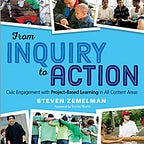Students in All Subjects Can Carry Out Civic Action Projects
Don’t let the phrase “civic action” make you think civic action projects are only for social studies classes! Teachers across subject areas and grade levels employ such activities to make their students’ learning meaningful and engaging.
In English language arts
Since civic action projects almost always involve reading, research, public speaking, and of course writing (letters, scripts, )blog posts, public service ads, speeches, policy proposals),they activate many literacy skills. And they expand topics and issues in kids’ reading into opportunities to for action that demonstrates the importance of their literacy learning in the real world.
In Science
Marnie Ware, biology teacher at Prosser Career Academy in Chicago, constantly reminds students that the topics and concepts they learn about can help them address issues in their lives and communities. Her ecology club has worked to promote healthy eating and the serving of fresh vegetables from the club’s garden in the school’s lunches.
In Math
Algebra teacher Brad Latimer, at Science Leadership Academy in Philadelphia, has students use math to analyze community problems and then plan and execute actions to address those problems.
In Art
Art teacher Mauricio Pineda, at Reilly School in Chicago, has guided his middle school students to create sculptures depicting issues they deal with in their young lives, putting on an art exhibit to inform the public about their concerns.
(Read stories about Marnie’s, Brad’s, and Mauricio’s efforts in the book, From Inquiry to Action, that helps teachers conduct such projects)
Across grade levels
Students of many age-levels can learn the skills and strategies to engage in civic and social action education. Fifth graders at Park Forest School in State College PA eagerly pursue projects for their school and community. Middle School students at Polaris Academy in Chicago are carrying out “Peacekeeper” projects as we speak. (These, too, are described in From Inquiry to Action.)
It’s important for all of us, as teachers, to take some time to teach with social action, and provide ways for our students to become citizens who use their voices thoughtfully in our communities.
